Stop Plastic Bags!
One advantage of being a CSA member that you may not have thought about is the very significant amount of waste that is removed from the landfill by a CSA program compared to the grocery store alternative. We have done a little bit of analysis, comparing the packaging for the first 4 CSA boxes of the year to the packaging that we would have used if we had sold the same produce to stores, restaurants and wholesalers instead. If we had sold to stores, we would have packed the produce into 1,095 waxed cardboard boxes, 319 non-waxed cardboard boxes and 61 plastic 25-lb bags! The plastic bags and waxed cardboard boxes generally end up in the landfill so the CSA results in a pretty significant reduction in the waste stream.
The Full Belly CSA program strives to reduce non-reusable packaging as much as possible and I believe that this may not always be true of the meal kits and other produce box options. We first bought our Stop Waste CSA green totes in 2013 and they have been very durable and successful. The only problem with them is that people like them so much that they are not always returned to the farm! The only other packaging that we use are the bags inside your CSA box and we usually only need one or two bags per week, so the overall packaging is minimal.
But… before we get too self congratulatory, I note that we are still using plastic bags, especially during the winter months. That is because lettuce or spinach in a paper bag can result in a wet mess. In the next few months, we hope to phase out the plastic bags because there are many environmental problems that they cause, aside from the fact that they end up in the landfill. They are a unique threat because unlike other waste, they travel long distances, blown out of garbage trucks and landfills, reaching streams, rivers and the ocean where they do not biodegrade. In waterways they break apart into smaller pieces and soak up toxins, becoming a deadly threat to sea turtles, birds and marine mammals. When plastic bags are put in the recycling, they jam machinery and can be expensive to remove. These are some of the reasons that many plastic bags have been banned in California grocery, and convenience stores.
We have to find an alternative that is not cost-prohibitive, and one option is to use BioBags made from a compostable plant resin that includes non GMO corn starch. BioBags are more expensive than plastic, but are preferable because they do not cause as many environmental problems. In fact BioBags, if composted seem like a great solution – but that “IF” might be a big one. If BioBags are put into the trash, they end up in the landfill and sit there, just like everything else. Modern landfills are designed to safely entomb waste and to protect the environment from the liquids and gases that are produced during the very breakdown of waste. By design, the landfills greatly retard the degradation process to reduce the by-products that might otherwise contaminate groundwater and the air. With little exposure to air, water and sunlight the BioBags do not break down efficiently if they end up in a landfill.
Most of our CSA service areas have curbside pick-up for compostable items. In Alameda County and the city of Davis, BioBags can be put into the curbside compost bin for pickup. We are checking with the Sacramento yard waste curbside pick-up to find out if that is also the case there. So BioBags seem like the most likely solution and you will probably start to see them in your boxes soon.
Waxed paper bags seem like another option (with a similar price point) because like BioBags, they don’t cause the environmental problems that plastic does. But waxed paper bags should not be put into your paper recycling – in fact they can ruin entire batches of recycled paper. Like the BioBags, waxed paper bags should be composted, but that might be less obvious to our members, since the BioBags are clearly printed with information about composting. Perhaps we would have to print that message onto the waxed paper bags to be on the safe side. We are interested to see which option our members would prefer.
What do you think? We would love to hear your opinion.
—Judith Redmond

Sometimes we get enthusiastic when we pack your boxes! Thank you Michael and Kathryn for sharing this photo of the big butternut squash that you found in your CSA box…

